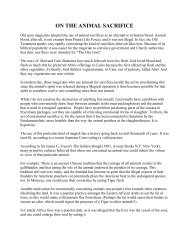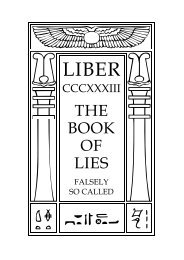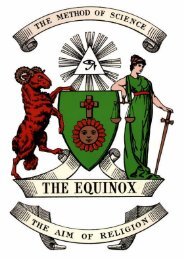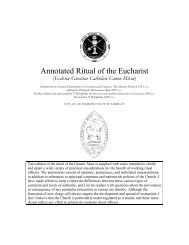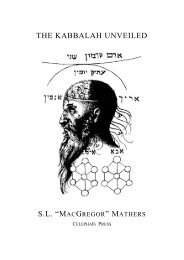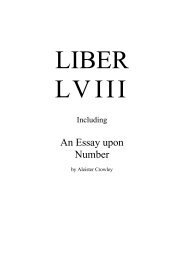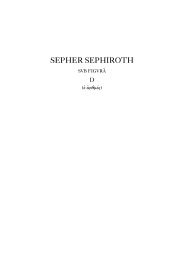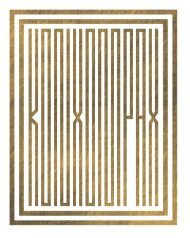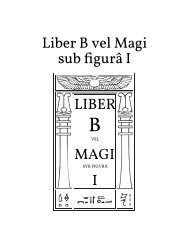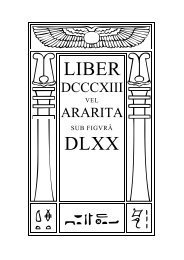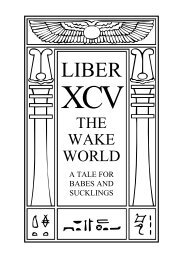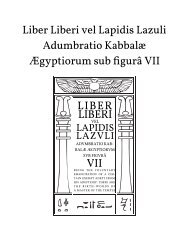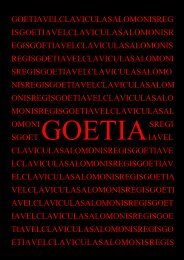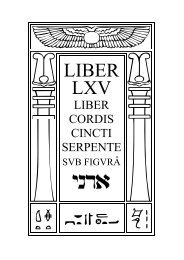- Page 2 and 3:
THE EQUINOX No. V THE great pressur
- Page 4 and 5:
T Crown 8vo, Scarlet Buckram, pp. 6
- Page 6 and 7:
The Star in the West BY CAPTAIN J.
- Page 8 and 9:
PRICE ONE GUINEA NET. To be had of
- Page 10 and 11:
The Editor will be glad to consider
- Page 12 and 13:
Boring but necessary legal stuff et
- Page 14 and 15:
THE VIOLINIST. BY FRANCIS BENDICK 2
- Page 16 and 17:
This page is reserved for Official
- Page 18 and 19:
2 THE EQUINOX The subscription for
- Page 20 and 21:
4 THE EQUINOX before a writ was ser
- Page 22 and 23: 6 THE EQUINOX Mathers Brother Wynn
- Page 25 and 26: LIBER III VEL JVGORVM
- Page 28 and 29: ARATUM SECURUM (Fra —— after on
- Page 30 and 31: 12 THE EQUINOX 0. The Unicorn is sp
- Page 32 and 33: 14 THE EQUINOX b. By some device, s
- Page 34 and 35: A∴ A∴ Publication in Class D. I
- Page 36 and 37: 18 THE EQUINOX Let him by his under
- Page 39 and 40: I.NSIT N.ATURAE R.EGINA I.SIS (Obta
- Page 41 and 42: I. NSIT N. ATURAE R. EGINA I. SIS A
- Page 43: MY LADY OF THE BREECHES A HISTORY
- Page 46 and 47: 28 THE EQUINOX I THE JUGGLER “AND
- Page 48 and 49: 30 THE EQUINOX father, her lying, u
- Page 50 and 51: 32 THE EQUINOX Twenty-one minutes p
- Page 52 and 53: 34 THE EQUINOX balancing before him
- Page 54 and 55: 36 THE EQUINOX CAPTAIN MARGARET. By
- Page 56 and 57: 38 THE EQUINOX There in the lonely
- Page 58 and 59: 40 THE EQUINOX And this—is this n
- Page 61 and 62: THE HERMIT WITH the seventh stage i
- Page 63 and 64: THE TEMPLE OF SOLOMON THE KING sail
- Page 65 and 66: THE TEMPLE OF SOLOMON THE KING comp
- Page 67 and 68: THE TEMPLE OF SOLOMON THE KING This
- Page 69 and 70: THE TEMPLE OF SOLOMON THE KING this
- Page 71: THE VEDANTA BEFORE we enter upon th
- Page 75 and 76: THE TEMPLE OF SOLOMON THE KING vidu
- Page 77 and 78: THE TEMPLE OF SOLOMON THE KING the
- Page 79 and 80: THE TEMPLE OF SOLOMON THE KING one
- Page 81 and 82: THE TEMPLE OF SOLOMON THE KING spro
- Page 83 and 84: THE TEMPLE OF SOLOMON THE KING “J
- Page 85 and 86: THE TEMPLE OF SOLOMON THE KING what
- Page 87 and 88: THE TEMPLE OF SOLOMON THE KING Ever
- Page 89 and 90: THE TEMPLE OF SOLOMON THE KING prin
- Page 91 and 92: THE TEMPLE OF SOLOMON THE KING Of B
- Page 93 and 94: THE TEMPLE OF SOLOMON THE KING Kshu
- Page 95 and 96: THE TEMPLE OF SOLOMON THE KING of E
- Page 97 and 98: THE TEMPLE OF SOLOMON THE KING 4. P
- Page 99 and 100: THE TEMPLE OF SOLOMON THE KING This
- Page 101 and 102: THE TEMPLE OF SOLOMON THE KING whic
- Page 103 and 104: THE TEMPLE OF SOLOMON THE KING or m
- Page 105 and 106: THE TEMPLE OF SOLOMON THE KING the
- Page 107 and 108: THE TEMPLE OF SOLOMON THE KING and
- Page 109: DIAGRAM 83. The Yogi (showing the C
- Page 112 and 113: 92 THE EQUINOX drinking it he will
- Page 114 and 115: 94 THE EQUINOX with a concentrated
- Page 116 and 117: 96 THE EQUINOX the secrets that eve
- Page 118 and 119: 98 THE EQUINOX called Prânâyâma.
- Page 120 and 121: 100 THE EQUINOX How to awake the Ku
- Page 122 and 123:
102 THE EQUINOX He should perform K
- Page 124 and 125:
104 THE EQUINOX and therefore over
- Page 126 and 127:
106 THE EQUINOX When once Dhâranâ
- Page 128 and 129:
108 THE EQUINOX OBJECT MEDITATED UP
- Page 131 and 132:
THE TEMPLE OF SOLOMON THE KING OBJE
- Page 133 and 134:
THE TEMPLE OF SOLOMON THE KING 3. t
- Page 135 and 136:
THE TEMPLE OF SOLOMON THE KING May;
- Page 137:
DIAGRAM 86. The Flashing Figure of
- Page 140 and 141:
116 THE EQUINOX At this city, on th
- Page 142 and 143:
118 THE EQUINOX May 19th. 1. Assump
- Page 144 and 145:
120 THE EQUINOX Hong-Kong. I found
- Page 146 and 147:
122 THE EQUINOX One hundred indrawn
- Page 148 and 149:
124 THE EQUINOX five days later he
- Page 150 and 151:
126 THE EQUINOX descended a God-ill
- Page 152 and 153:
128 THE EQUINOX and produce emotion
- Page 154 and 155:
130 THE EQUINOX its place wrote Nib
- Page 156 and 157:
132 THE EQUINOX or Soul; and a Sele
- Page 158 and 159:
134 THE EQUINOX is non-existent. Ea
- Page 160 and 161:
136 THE EQUINOX neither Flame nor A
- Page 162 and 163:
138 THE EQUINOX so the Karma, relea
- Page 164 and 165:
140 THE EQUINOX the second The Invo
- Page 166 and 167:
142 THE NOBLE EIGHTFOLD PATH In pla
- Page 168 and 169:
144 THE EQUINOX out the Four Noble
- Page 170 and 171:
146 THE EQUINOX one stupendous magi
- Page 172 and 173:
148 THE EQUINOX enlightened, he doe
- Page 174 and 175:
150 THE WRITINGS OF TRUTH* The seek
- Page 176 and 177:
152 THE EQUINOX It was on this day
- Page 178 and 179:
154 THE EQUINOX The next is as the
- Page 180 and 181:
156 THE EQUINOX and from the centre
- Page 182 and 183:
September 5th. 12.15-12.52 p.m. p.m
- Page 184 and 185:
September 9th. 9.50-10.20 a.m. a.m.
- Page 186 and 187:
162 THE EQUINOX Two practices of Pr
- Page 188 and 189:
September 29th. 12.0 m.n. 164 11.15
- Page 190 and 191:
166 THE EQUINOX October. Prânâyâ
- Page 192 and 193:
168 THE EQUINOX itself a suicidal W
- Page 194 and 195:
170 THE EQUINOX We append the follo
- Page 196 and 197:
172 THE EQUINOX On the 7th of March
- Page 198 and 199:
174 THE EQUINOX (1903). In the mont
- Page 200 and 201:
176 THE EQUINOX snow, and the fair
- Page 202 and 203:
178 THE EQUINOX (2) That I consider
- Page 204 and 205:
July 2nd. 180 THE EQUINOX BEGIN. EN
- Page 206 and 207:
182 THE EQUINOX BEGIN. END. OBJECT.
- Page 208 and 209:
184 THE EQUINOX 6. Perhaps as a res
- Page 210 and 211:
186 THE EQUINOX meteorites they see
- Page 212 and 213:
188 THE EQUINOX they would progress
- Page 214 and 215:
190 THE EQUINOX of the great mounta
- Page 216 and 217:
192 THE EQUINOX He realised that th
- Page 218 and 219:
194 THE EQUINOX not only methods of
- Page 220 and 221:
196 THE EQUINOX from view, but ever
- Page 222:
198 THE EQUINOX You were mine, O my
- Page 225 and 226:
THE INTERPRETER MOTHER of Light, an
- Page 227 and 228:
THE DAUGHTER OF THE HORSELEECH A FA
- Page 229 and 230:
THE DAUGHTER OF THE HORSELEECH one
- Page 231 and 232:
THE DAUGHTER OF THE HORSELEECH “S
- Page 233 and 234:
THE DAUGHTER OF THE HORSELEECH and
- Page 235 and 236:
MR. TODD A MORALITY BY THE AUTHOR O
- Page 237 and 238:
MR. TODD PERSONS OF THE PLAY GRANDF
- Page 239 and 240:
ACT I GRANDFATHER sunk in melanchol
- Page 241 and 242:
MR. TODD OSSORY. Thank you, my dear
- Page 243 and 244:
MR. TODD sentiments. I have heard v
- Page 245 and 246:
MR. TODD GRANDFATHER. Oh, my sciati
- Page 247 and 248:
MR. TODD CARR. —Anything I don't
- Page 249 and 250:
MR. TODD not Shaw! Vaughan, or Gore
- Page 251 and 252:
MR. TODD DELHOMME. Of you—of thee
- Page 253 and 254:
MR. TODD Nothing right nowadays! Oh
- Page 255 and 256:
MR. TODD OSSORY. that's it! they wo
- Page 257 and 258:
MR. TODD one never knows whether yo
- Page 259 and 260:
MR. TODD EUPHEMIA. How splendid! Yo
- Page 261 and 262:
MR. TODD I hate you! I hate you! Wh
- Page 263 and 264:
THE GNOME Stumbling over the fallen
- Page 265 and 266:
REVIEWS DARE TO BE WISE. By JOHN MC
- Page 267:
THE HERB DANGEROUS PART IV A FEW EX
- Page 270 and 271:
244 THE EQUINOX minnesinger, or "tr
- Page 272 and 273:
246 THE EQUINOX I had now almost co
- Page 274 and 275:
248 THE EQUINOX “Shall I call her
- Page 276 and 277:
250 THE EQUINOX I rose that I might
- Page 278 and 279:
252 THE EQUINOX peal of unextinguis
- Page 280 and 281:
254 THE EQUINOX of hasheesh delirum
- Page 282 and 283:
256 THE EQUINOX place upon the bier
- Page 284 and 285:
258 THE EQUINOX shall beget the day
- Page 286 and 287:
260 THE EQUINOX delicious dreams, I
- Page 288 and 289:
262 THE EQUINOX I sought to turn th
- Page 290 and 291:
264 THE EQUINOX of high activity, a
- Page 292 and 293:
266 THE EQUINOX this tenet should n
- Page 294 and 295:
268 THE EQUINOX yet it may be long
- Page 296 and 297:
270 THE EQUINOX nobody else might b
- Page 298 and 299:
272 THE BUDDHIST THERE never was a
- Page 300 and 301:
THE AGNOSTIC An Agnostic is one who
- Page 302 and 303:
276 THE EQUINOX Half skilled to ago
- Page 304 and 305:
278 THE EQUINOX harsh and wild, irr
- Page 306 and 307:
280 THE EQUINOX With an angel’s s
- Page 308 and 309:
282 THE EQUINOX SIMPLEX. Behold aga
- Page 310 and 311:
284 HALF-HOURS WITH FAMOUS MAHATMAS
- Page 312 and 313:
286 THE EQUINOX “Ha,” he replie
- Page 314 and 315:
288 THE EQUINOX “Virtue,” he de
- Page 316 and 317:
290 THE EQUINOX three head bell-wet
- Page 318 and 319:
292 THE EQUINOX SHELLEY. By FRANCIS
- Page 321 and 322:
THE EYES OF ST. LJUBOV I “TELL it
- Page 323 and 324:
THE EYES OF ST. LJUBOV winter, star
- Page 325 and 326:
THE EYES OF ST. LJUBOV man and a ph
- Page 327 and 328:
THE EYES OF ST. LJUBOV by her golde
- Page 329 and 330:
THE EYES OF ST. LJUBOV of being a g
- Page 331 and 332:
THE EYES OF ST. LJUBOV “What, do
- Page 333 and 334:
THE EYES OF ST. LJUBOV Briefly—fo
- Page 335 and 336:
THE EYES OF ST. LJUBOV wounded ears
- Page 337 and 338:
THE POETICAL MEMORY AN ESSAY I AM o
- Page 339 and 340:
THE POETICAL MEMORY This explanatio
- Page 341 and 342:
ADELA Through maze on maze of silen
- Page 343 and 344:
THE THREE WORMS IN the great vault
- Page 345 and 346:
THE THREE WORMS citadel of her hear
- Page 347 and 348:
THE THREE WORMS “Much have I look
- Page 349 and 350:
THE THREE WORMS “I am her heart,
- Page 351 and 352:
THE FELON FLOWER AS the sighing of
- Page 353 and 354:
THE BIG STICK COUNTERPARTS. Vol XVI
- Page 355 and 356:
THE BIG STICK “Berashith” and
- Page 357 and 358:
THE BIG STICK of novelists; one fee
- Page 359 and 360:
THE BIG STICK One was intensely bor
- Page 361 and 362:
THE BIG STICK THE DEVIL: “Let us
- Page 363 and 364:
THE BIG STICK ing—and clean-minde
- Page 365 and 366:
THE BIG STICK lot of holy souteneur
- Page 367 and 368:
THE BIG STICK as his own, and so ap
- Page 369 and 370:
THE BIG STICK he is so keen to find
- Page 371 and 372:
THE BIG STICK Just as a dishonest c
- Page 373 and 374:
GLAZIERS’ HOUSES Tories was but a
- Page 375 and 376:
GLAZIERS’ HOUSES from the Overmen
- Page 377 and 378:
GLAZIERS’ HOUSES It hat never had
- Page 379:
SPECIAL SUPPLEMENT THE HIGH HISTORY
- Page 383 and 384:
ARGUMENT i. Sir Palamede, the Sarac
- Page 385 and 386:
SIR PALAMDES, THE SARACEN KNIGHT xx
- Page 387:
THE HIGH HISTORY OF GOOD SIR PALAME
- Page 390 and 391:
4 THE HIGH HISTORY OF GOOD So halte
- Page 392 and 393:
6 BEHOLD! Arabia’s burning shore
- Page 394 and 395:
8 SIR PALAMEDES, THE SARACEN KNIGHT
- Page 396 and 397:
10 THE HIGH HISTORY OF GOOD But day
- Page 398 and 399:
12 IV NOW, with two score of men in
- Page 400 and 401:
14 SIR PALAMEDES, THE SARACEN KNIGH
- Page 402 and 403:
16 THE HIGH HISTORY OF GOOD His str
- Page 404 and 405:
18 VI SIR PALAMEDE the Saracen The
- Page 406 and 407:
20 THE HIGH HISTORY OF GOOD With la
- Page 408 and 409:
22 VII BEHOLD Sir Lancelot of the L
- Page 410 and 411:
24 SIR PALAMEDES, THE SARACEN KNIGH
- Page 412 and 413:
26 SIR PALAMEDES, THE SARACEN KNIGH
- Page 414 and 415:
28 SIR PALAMEDES, THE SARACEN KNIGH
- Page 416 and 417:
30 SIR PALAMEDES, THE SARACEN KNIGH
- Page 418 and 419:
32 SIR PALAMEDES, THE SARACEN KNIGH
- Page 420 and 421:
34 SIR PALAMEDES, THE SARACEN KNIGH
- Page 422 and 423:
36 THE HIGH HISTORY OF GOOD But plu
- Page 424 and 425:
38 XIV NORTHWARD the good knight ga
- Page 426 and 427:
40 XV SIR PALAMEDE the Saracen Hath
- Page 428 and 429:
42 SIR PALAMEDES, THE SARACEN KNIGH
- Page 430 and 431:
44 SIR PALAMEDES, THE SARACEN KNIGH
- Page 432 and 433:
46 THE HIGH HISTORY OF GOOD Intangi
- Page 434 and 435:
48 SIR PALAMEDES, THE SARACEN KNIGH
- Page 436 and 437:
50 THE HIGH HISTORY OF GOOD And eag
- Page 438 and 439:
52 XIX THE knight hath found a nake
- Page 440 and 441:
54 THE HIGH HISTORY OF GOOD When, w
- Page 442 and 443:
56 XX SIR PALAMEDE hath reasoned ou
- Page 444 and 445:
58 XXI Now doth Sir Palamede advanc
- Page 446 and 447:
60 SIR PALAMEDES, THE SARACEN KNIGH
- Page 448 and 449:
62 SIR PALAMEDES, THE SARACEN KNIGH
- Page 450 and 451:
64 SIR PALAMEDES, THE SARACEN KNIGH
- Page 452 and 453:
66 SIR PALAMEDES, THE SARACEN KNIGH
- Page 454 and 455:
68 SIR PALAMEDES, THE SARACEN KNIGH
- Page 456 and 457:
70 SIR PALAMEDES, THE SARACEN KNIGH
- Page 458 and 459:
72 SIR PALAMEDES, THE SARACEN KNIGH
- Page 460 and 461:
74 THE HIGH HISTORY OF GOOD With fi
- Page 462 and 463:
76 XXIX HA! but the good knight, st
- Page 464 and 465:
78 XXX STARRED is the blackness of
- Page 466 and 467:
80 SIR PALAMEDES, THE SARACEN KNIGH
- Page 468 and 469:
82 THE HIGH HISTORY OF GOOD Of ligh
- Page 470 and 471:
84 XXXII “HA!” cries the knight
- Page 472 and 473:
86 XXXIII SIR PALAMEDE the Saracen
- Page 474 and 475:
88 XXXIV SIR PALAMEDE the Saracen H
- Page 476 and 477:
90 XXXV “YEA!” quoth the knight
- Page 478 and 479:
92 SIR PALAMEDES, THE SARACEN KNIGH
- Page 480 and 481:
94 THE HIGH HISTORY OF GOOD He woke
- Page 482 and 483:
96 XXXVII SIR PALAMEDE is sick to d
- Page 484 and 485:
98 SIR PALAMEDES, THE SARACEN KNIGH
- Page 486 and 487:
100 THE HIGH HISTORY OF GOOD Thief
- Page 488 and 489:
102 XXXIX GREEN and Grecian is the
- Page 490 and 491:
104 SIR PALAMEDES, THE SARACEN KNIG
- Page 492 and 493:
106 THE HIGH HISTORY OF GOOD That c
- Page 494 and 495:
108 SIR PALAMEDES, THE SARACEN KNIG
- Page 496 and 497:
110 THE HIGH HISTORY OF GOOD As the
- Page 498 and 499:
112 THE HIGH HISTORY OF GOOD Surely
- Page 501 and 502:
George Raffalovich’s forthcoming
- Page 503 and 504:
A. COLIN LUNN, Cigar Importer and C
- Page 505:
[It appears that the key entry of t



